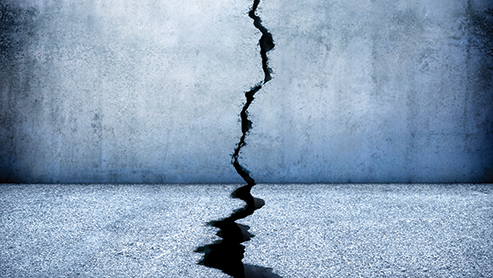Earthquakes: Tips to Prepare

Earthquakes can be sudden, scary, and sometimes, calamitous. Depending upon where you live or work, the risk can be higher, so making preparations now can be critical to the outcome following such an event.
While safety for humans is obviously most important, taking steps to protect property might help mitigate some of the financial loss incurred. Since standard homeowners, renters, and business insurance policies do not typically cover damage from earthquakes, be sure to check with your insurance agent about adding earthquake coverage through an endorsement or as a separate policy.
Other tips are shared here.
Protecting Individuals
- Business owners should prepare an emergency plan for supervisors and managers to follow during an earthquake. Home owners should prepare a plan for family members/visitors.
- Identify safe spots to shelter in every room; stay away from windows, loose objects, and outside walls.
- Know the location of utility shut-offs such as gas, water, and electricity.
- Prepare disaster kits that include medicine, first aid supplies, blankets, batteries, flashlights, etc., and are readily accessible.
- Enroll in a local alert program for warnings, information about aftershocks, and other post-tremor threats.
- Practice emergency procedures periodically including motions and movements, such as: (1) dropping to your hands and knees, (2) covering your head/neck with an arm and hand, (3) crawling underneath a steady desk or table, and (4) holding onto something stable until the earthquake subsides.
Protecting Property
Secure Furniture & Objects
- Secure furniture, artwork, mirrors, and hanging items by using hooks or closed screws and attaching to building studs.
- Fasten bookcases and cabinets to nearby walls; stabilize by attaching back-to-back. Keep heavy items on low shelves.
- Install strong latches on cabinets doors; place heavy objects on the bottom.
- Secure electronic equipment to floors or table surfaces with braces, hook and loop closures, or heavy glue.
- Use flexible connectors where gas lines meet appliances.
Build/Retrofit for Resistance
- For new buildings, ensure the roof and floors are properly connected to walls and the structural frame; ensure walls and frame are properly anchored to a strong foundation.
- For existing buildings, consider retrofitting the structural system during a remodeling project. Ensure water, gas, and power systems can maintain functionality during an earthquake.
- Work with a structural engineer as needed.
- Perform routine maintenance and inspection activities; look for structural damage or any signs of property vulnerability.
Records
- Maintain an electronic record (inventory records, photos and/or video) of your property and contents and store remotely.
Recovering from a Quake
If an earthquake damaged your property, get the claims process started by contacting
your insurance carrier or agent to review your coverage and file a claim. Take photos and videos of the damage and keep a record of any expenses incurred for your claims adjustor’s consideration.
Take any measures to prevent your property from further damage, but don’t put yourself in harm’s way by entering an unstable structure. Watch out for debris or exposed electrical wires around the perimeter and inside. Ensure any tenants, employees, family members, etc. who were inside your property are safe.
Information has been extracted from the Insurance Institute for Business & Home Safety’s, “Ways to Protect Your Business from Earthquake Damage” (visit http://ibhs.org) as well as other sources noted.
Helpful Resources
AMERICAN RED CROSS
https://www.redcross.org/get-help/how-to-prepare-for-emergencies/types-of-emergencies/earthquake. html
OSHA
https://www.osha.gov/earthquakes/preparedness
Disclaimer: The GUARD Wire is designed to provide general information about various topics of interest and should NOT replace the guidance, advice, or recommendations from licensed insurance or legal professionals, other industry experts, or state and federal authorities.


